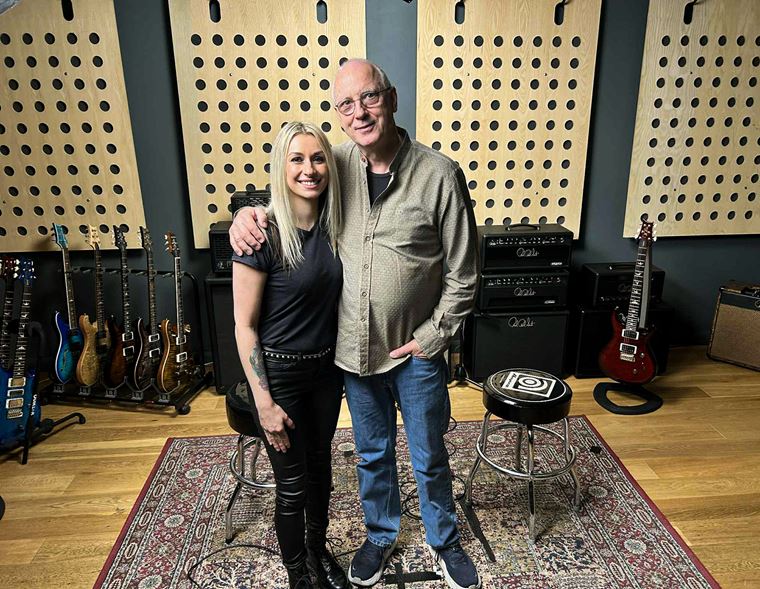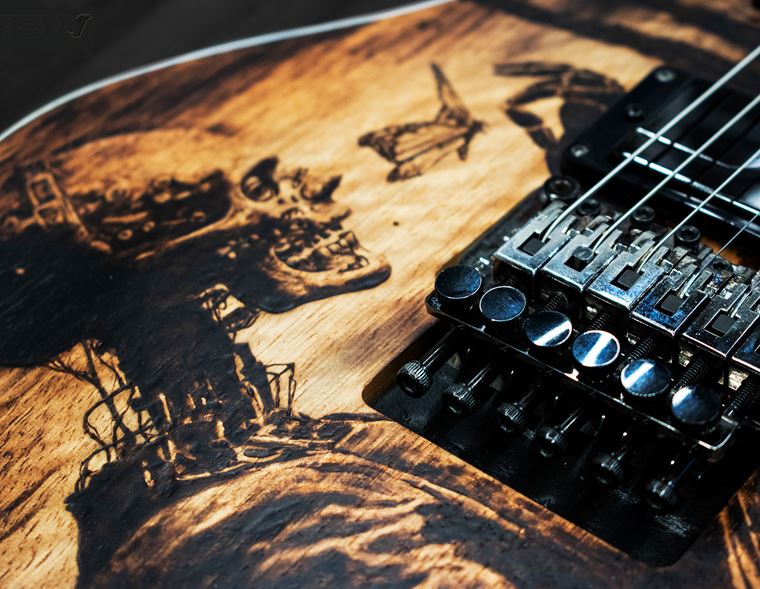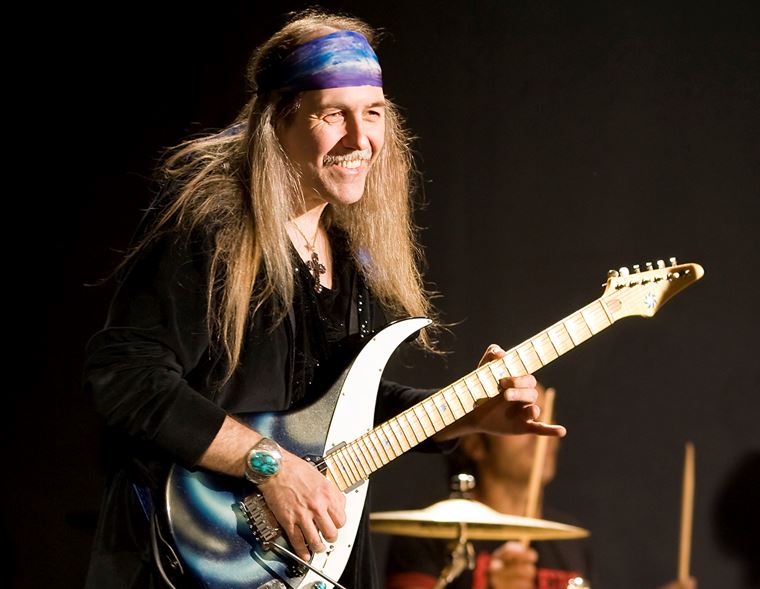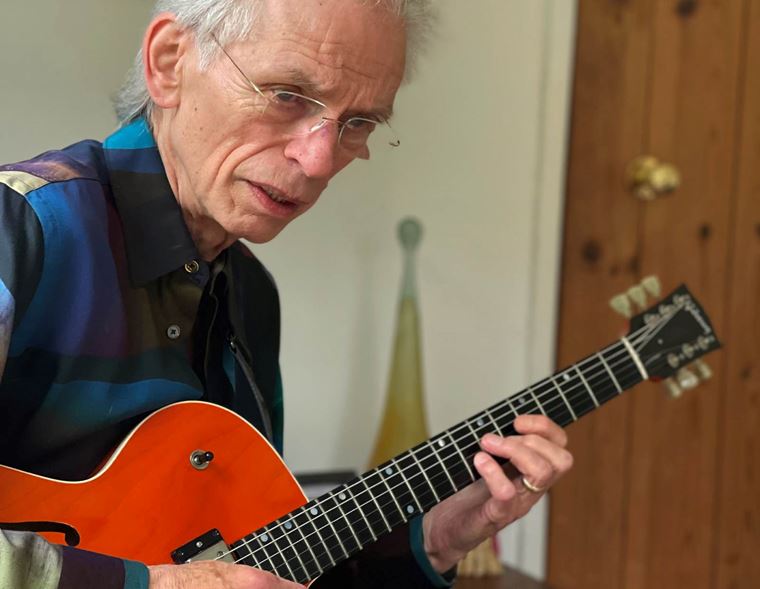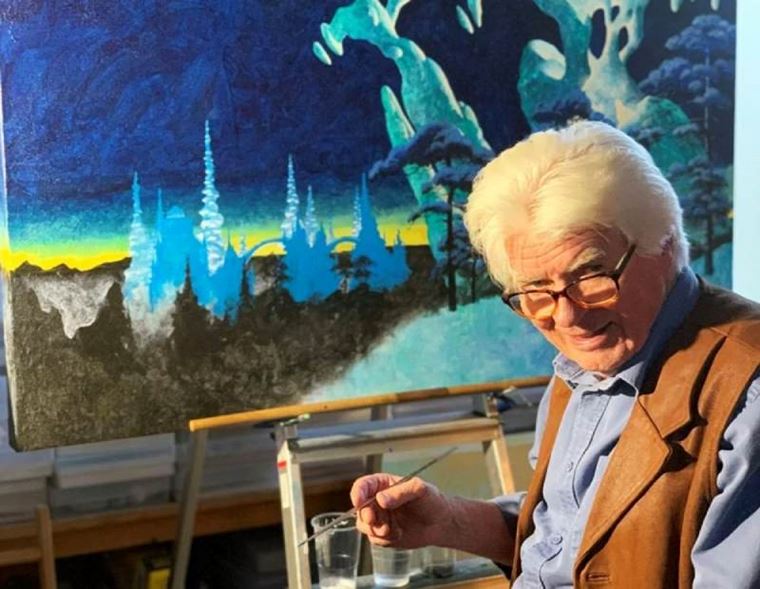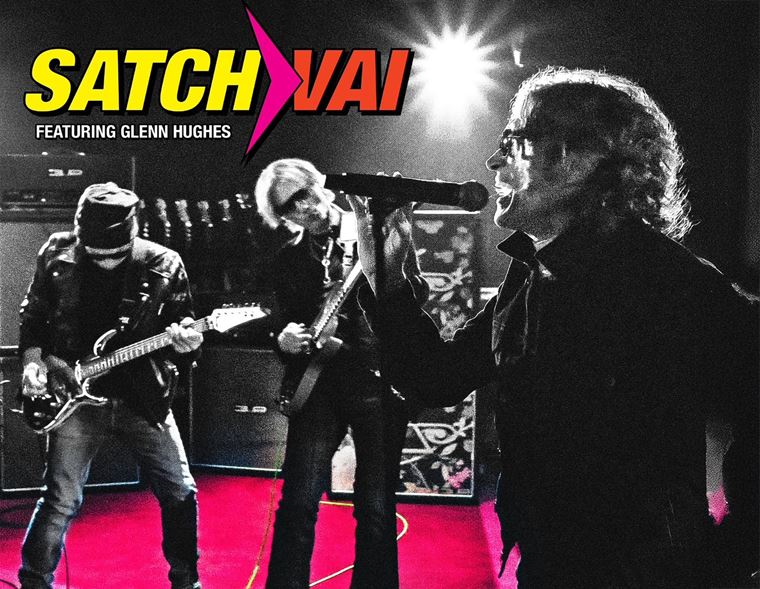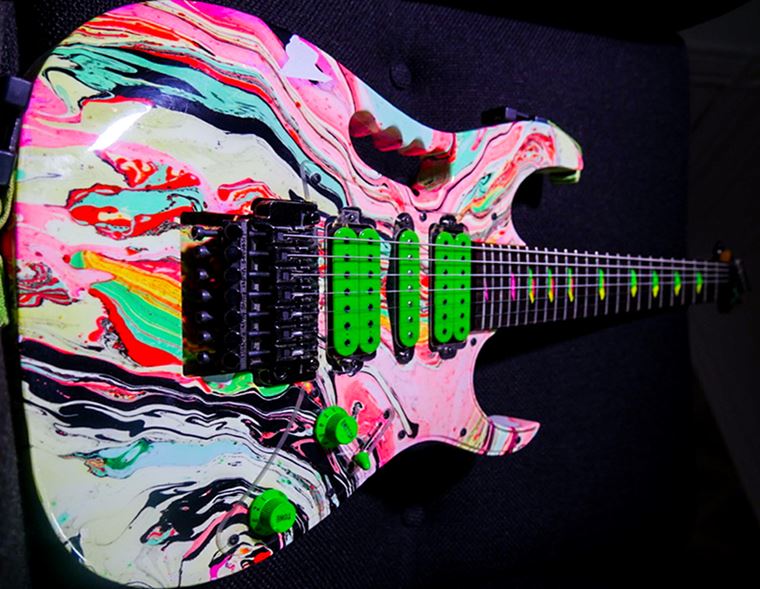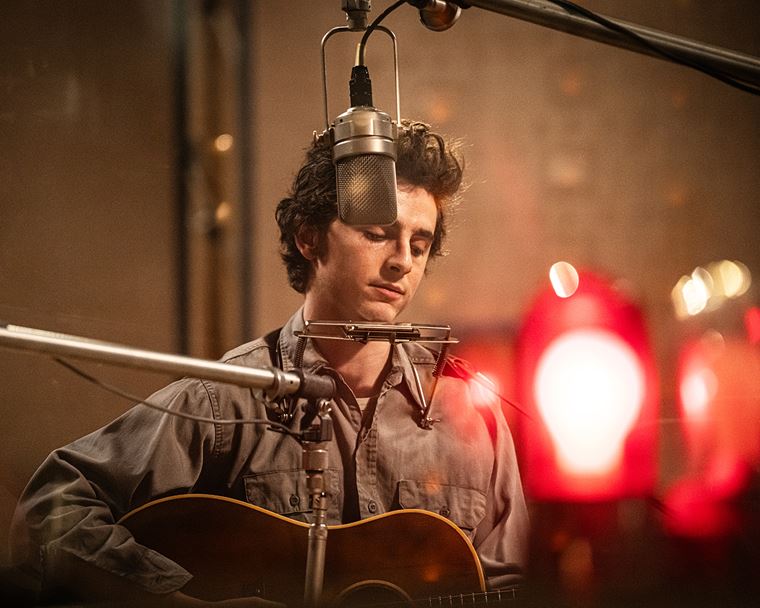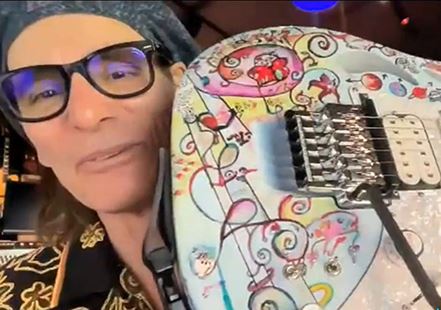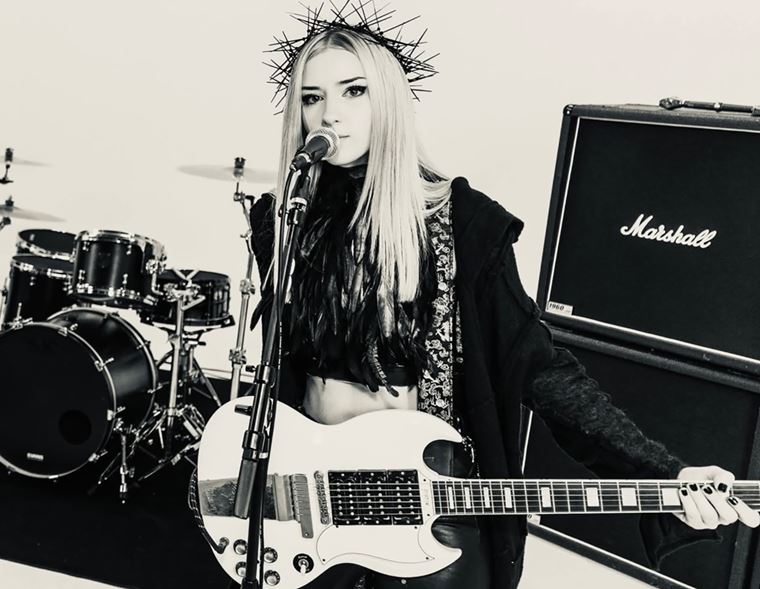Daniel Davies on HALLOWEEN and Lost Themes
When your dad is The Kinks’ guitarist Dave Davies, you grow up understanding Rock music.
When your godfather is horror maestro John Carpenter, you grow up understanding horror.
Such is life for Daniel Davies, composer, musician and collaborator on John Carpenter’s Lost Themes records, as well as a brace of legit soundtracks including 2018’s Halloween reboot.
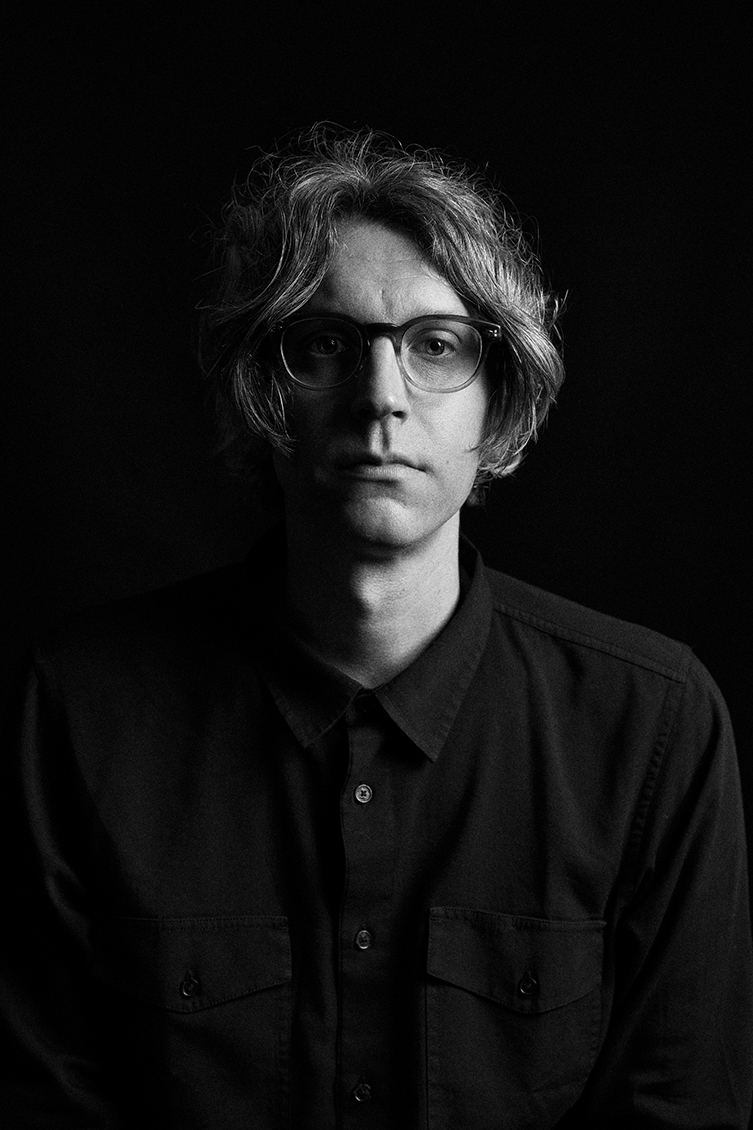
Daniel Davies (Photo: Sophie Gransard)
Since 2015, Davies was worked with the horror legend and his son Cody to create an ever-expanding suite of atmospheric, spine-tingling pieces of instrumental music. These Lost Themes are meant as soundtracks to films that would play out in your own imagination, and slot in perfectly with Carpenter’s own much-heralded soundtrack work.
Indeed, it’s something of a generalisation to call John Carpenter a horror movie director, given that some of his best loved movies include Escape from New York and Big Trouble in Little China. The fact remains, he also made indie movie history with Halloween and quickly went on to create some of the best loved horrors ever, like The Fog and The Thing with Kurt Russell, so the reputation is justified!
Horror is where the trio’s music seems to be sitting most comfortably, for the moment at least. Lost Themes III contains songs such as The Dead Walk and Vampire’s Touch, so it’s clear that horror is high on the agenda!
With Lost Themes III due for imminent release, we took a lucky opportunity to catch up with Daniel at his home in Los Angeles to talk all things music and horror...
Daniel Davies Interview
guitarguitar: So, how is it in Los Angeles just now?
Daniel Davies: It’s fine, you know? At nights, the streets are empty...it’s unusual! But we’re hanging in.
GG: Glad to hear it. So, why don’t we start at the beginning? Now, I understand that you’re John’s godson, which explains how you know him, but I wondered: how did you end up getting to be a member of his band?
DD: Well, him and Cody had made some demos, I guess that would have been about 2015, and his music attorney had a relationship with Sacred Bones (record label) and had heard these demoes. They asked if he was interested in making an album. And then, at that time, I had just started to, um, stop doing band-type stuff: you know, touring and making albums. I was getting more into making work for TV or movies and stuff, and recording on my own. So, around that time, John was asked about making the album, so he asked if I wanted to work on the album with him. Cody was living in Japan, so John and I would start.
We weren’t kids anymore: when we were young, we’d learn music from him and hang out. It was years later that it all kind of worked together. It just lined up that way! We started working on it, and from there it just kept snowballing into different things and became what it is now.
GG: Okay, cool! One thing that I think is worth asking: when you were a kid, did you grow up watching his movies?
DD: Well, so, when I was little, my dad was a fan of John’s work. I think this is how they know each other: I think he had written him a letter saying, ‘Oh, I love your movies, we should hang out some time’, and maybe the Kinks were on a tour in America and they met? We were still living in England at the time and he had a bunch of John’s movies, but I was too young! I wasn’t allowed to watch them! (laughs) Yeah, so then...what was the question? Hahaha!
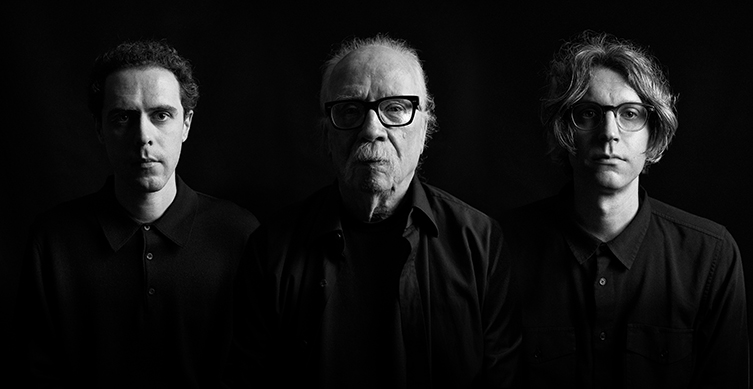
Cody, John and Daniel (Photo: Sophie Gransard)
GG: Haha, I just wondered about you watching those movies growing up. If it was me, I think it would be amazing as an adult to work on John Carpenter’s music because I endlessly watched The Fog and Halloween as a kid.
DD: Well yeah, I was really young at that time, I was like, eleven years old. So, as I grew up, I’d be like, ‘Well, what are they doing all the time? What’s he do?’ You know? Like, Halloween, okay, what’s that? So, we would watch that, and then The Thing and Starman. I think Prince of Darkness was the first one that I saw. What happened was, the first time I was left alone as a kid, I watched it and...uh...started lighting fires after it! (laughs) Freaked me out! But as I grew up, you see how creativity is working, and, you know, you talk about movies and music and watch stuff, listen to albums and different stuff like that. Then, as you become a teenager, it all just starts. You kind of notice what’s happening more, and I just happened to be interested in it.
GG: Totally! So, with the Lost Themes music, the concept behind it is soundtracks to movies that could have existed but don’t exist. I wondered, before we get on to that, there’s a very specific sonic vibe to these albums. They are quite deliberately 80s-influenced horror-type soundtracks. Does that dictate to you, as a musician, what you can and can’t do, musically?
DD: No, I don’t think so, it just kind of turns out that way. It’s John Carpenter’s Lost Themes, so it’s guided by John at the end, you know? That’s what he likes. He loves synth music. I think at the time Lost Themes came out, there was an appreciation for soundtrack music happening at the same time.
GG: Yeah.
DD: I dunno, they don’t sound retro to me, they just sound ‘synthy’! It all stems from, ‘how can you orchestrate something with just three people?’ or even one person! Those are the sounds that we like and sometimes they sound retro, you know?
GG: Sure. Maybe part of that is to do with synthesizers in general having had a huge cultural cache during a certain period of movies and things like that, so that you play that big synth string sound, it’s going to have a bunch of baggage attached to it anyhow, right?
DD: Right, yeah. And we don’t really think about that, we just go through and find what we like, and use that!
GG: Okay!
DD: You know? It just happens to fit that feeling. Everyone puts it where they want.
GG: That leads me onto the next question: when I saw you guys perform in Edinburgh, you were playing guitar, and presumably you handle all of the guitar parts on the records too, but do you also play keyboards as well?
DD: Yeah! Mainly, I’m a guitar player, but certain stuff I write on the keyboard because it’s just...well, if you have a synth, you can’t write that part on a guitar. Like, arpeggiation sequences, I would not think of doing that on a guitar.
GG: No, no, it would be a waste of time!
DD: Right! But in this way, because John and Cody, they come from keyboards, then a lot of the guitar parts become different, because you take something from a keyboard and then play it on guitar, it just changes it. Pitches are higher or lower, where you can play it is different, if it’s comfortable... sometimes what’s comfortable to me, playing on guitar, is not naturally what I would play on the keyboard.
GG: Uh-huh.
"Cody and I were working on a piece of music on Lost Themes II and John just goes, ‘That is Bela Lugosi. That sounds like Bela Lugosi!'"
DD: They seem different to me.
GG: Very much, I quite agree. In terms of the writing process then: do you all bring ideas to the table?
DD: Uh, well it’s all different. Sometimes John will have an idea that he wants to try, and then other times he’ll say...you know, we all bring in sketches. He’ll say, ‘let’s all bring in some ideas’. And then, we all go through them and if we all like each other’s ones, those are the ones we pick and start working on. Then they all evolve. Or, I’ll have an A-section, and I’ll say to john, Okay, we need a B-section here, what to you wanna do here?’ Or vice versa.
GG: Cool, so it’s all very collaborative.
DD: Yeah.
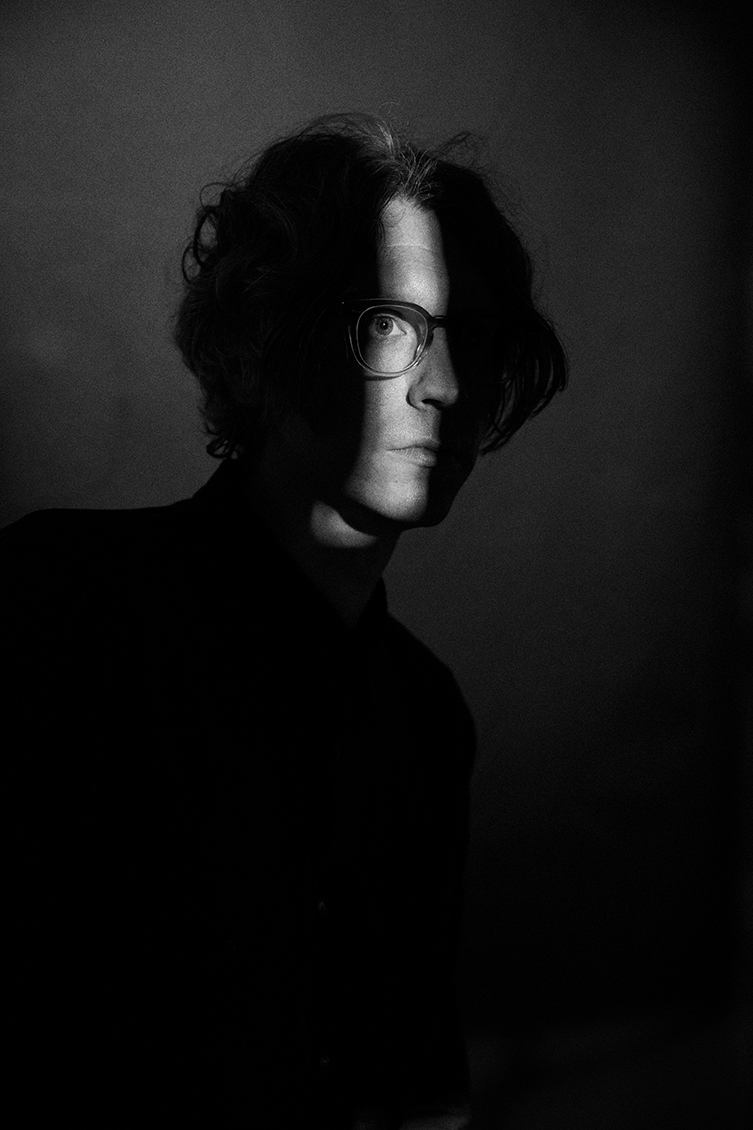
Daniel Davies (Photo: Sophie Gransard)
GG: One of the things I really enjoy is the song titles! It’s blatant horror stuff! Vampire’s Touch and Carpathian Darkness. Do the titles come first? Like, ‘What does a song called Alive After Death sound like?’ Or do you write a bunch of music and the titles come later?
DD: Uh...It’s all random! (laughs) It’s just...I’m not sure, I mean, sometimes some things have just temporary titles. For instance, Cody and I were working on a piece of music on Lost Themes II and John just goes, ‘That is Bela Lugosi. That sounds like Bela Lugosi!’ (laughs) Or, Alive After Death, I had written that down and John said, ‘Okay, that song should be Alive After Death’. And then we just go through them and see what they sound like to us. But yeah, it all just evolves.
GG: The title I really like is the one that’s just called Skeleton! Was that one of those times where John just went, ‘That sounds like a skeleton!’ Something like that, right? Haha!
DD: Haha, no, I just think...uh, no, that one was not like that. (laughs) I don’t remember how that name came about! I think John’s just inclined to come up with stuff like that.
GG: Okay, that’s fair enough! It sounds like a very creative situation. So, my next question sounds really random but I think’s worth asking...
DD: Okay.
GG: Seeing how it’s Lost Themes for these kinds of like fictional movie soundtracks: do you guys go as far as coming up with storylines and narratives for each Lost movie?
DD: (pause) No. (laughs)
GG: Hahaha! Brilliant, that’s fine!
DD: No, the idea is its soundtracks for the movies in your mind!
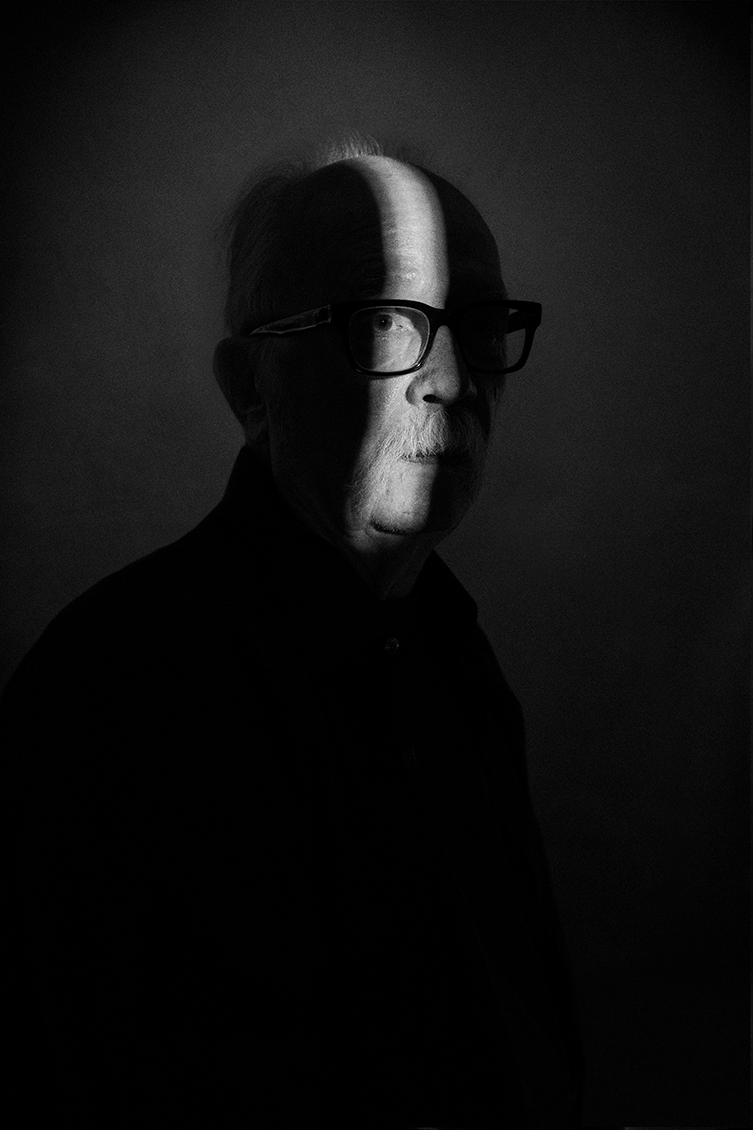
John Carpenter (Photo: Sophie Gransard)
GG: Cool, okay. That’s brilliant. So, let’s talk about guitars! When I saw you guys play, it was a Gibson ES-335 you were using. What kind of guitar equipment did you use this time for Lost Themes III?
DD: So yeah, I used that 335 a lot, and then I also used a Telecaster. I use a Kemper Profiler and a friend of mine has a bunch of vintage amps that we profiled. I used all of that and I think I might have used it on that tour, too, plugging it into a cabinet. I mean, I have a bunch of pedals and stuff. Some pedals that I use a lot are... (reaches over to look at his pedalboard) There’s a company called Origin Effects that I like, they make a good compressor and an overdrive. I use that, pretty simple, and a Moog MF-Drive, I use for some gain, you know? Distortion. Pretty much that’s it, and then the Dispatch Master, you know that company Earthquaker Devices?
GG: Yeah, I know them well!
DD: Yeah. And I try stuff, and I just wind up using that. Simple. I think with stuff, if it’s too complicated, I lose interest! Too many knobs...if it does too many things, I get overwhelmed and then I don’t care. (laughs)
GG: Yeah, totally! Haha! So, the Kemper profiles: do you remember any of the vintage amps that you profiled? That would be quite interesting for our readers.
DD: Yeah, so it’s like an old purple AC30? I think it’s a 60s AC30. I pretty much just use that all the time, because it’s the one at the top of the list, because it’s ‘AC’ (laughs) I have it here, I can have a look. That’s the one I use most, and there’s a Fender Princeton Reverb but it doesn’t profile reverbs, so it’s not a ‘reverb’. And then I think, oh yeah, a black Plexi Marshall and a purple Plexi Marshall, too. I don’t remember what years all that stuff is, umm...
GG: Don’t worry, it’s just interesting to hear! It’s all quite classic tube amp stuff. That’s kind of what I got from listening to the record. You have a classic rock gain sound. Having said that, the solo on Alive After Death has a kind of ‘mangled’ sound. I mean that in a good way! It’s got a nice ‘squashed-ness’ to it! Was that just a combination of the Kemper and some of your effects pedals?
DD: Yeah, everything sounds mangled and squashed when I play it! (laughs) Yeah, it’s compressed. That’s a Tele, just compressed and distorted and it just gets that sound! But yeah, it is a bit mangled! But, you know, sometimes, I noticed just in general, playing with the stuff with John, is that the notes need to hang on a long time. When you’re used to doing stuff with synths, you hit the note and you can make it never end! Sometimes it’s hard to compete with that on guitar because it’s gonna die out. It’s not really competing, but just trying to find a balance when you need the note to hang longer, so I need more distortion, and then I try to control that somehow. And that solo on that song is in 7, so there’s a couple extra beats that normally you wouldn’t need! So, I dunno, it just kinda came out that way, the sound fit and so we kept it.
GG: It’s a great piece of playing, and there’s great playing throughout the record. It’s not always the easiest thing to blend electric guitar with synth sounds, unless you go as far as the full-on square wave fuzz Trent Reznor sound. What you guys do is not that easy to pull off.
DD: Yeah...well, cool! (laughs) I don’t really think about it that much! But yeah, that’s a different style, you know? They have a great sound. I dunno!
"I think with stuff, if it’s too complicated, I lose interest! Too many knobs...if it does too many things, I get overwhelmed and then I don’t care!"
GG: Yeah, it wasn’t really even a question, I guess, haha! It was just: nice one!
DD: Haha, yeah, thanks! But on some newer stuff that hasn’t come out, I’ve started using baritone guitar and stuff like that. That’ll come out later, I guess.
GG: What’s that gonna be on?
DD: Well, I’ve been working on a new solo EP and I’m using the baritone guitar on that. Getting into some other things too.
GG: Sweet, that’ll be something to look forward to as well. In terms of your usual guitars, what are your preferences for things like string gauge and plectrums?
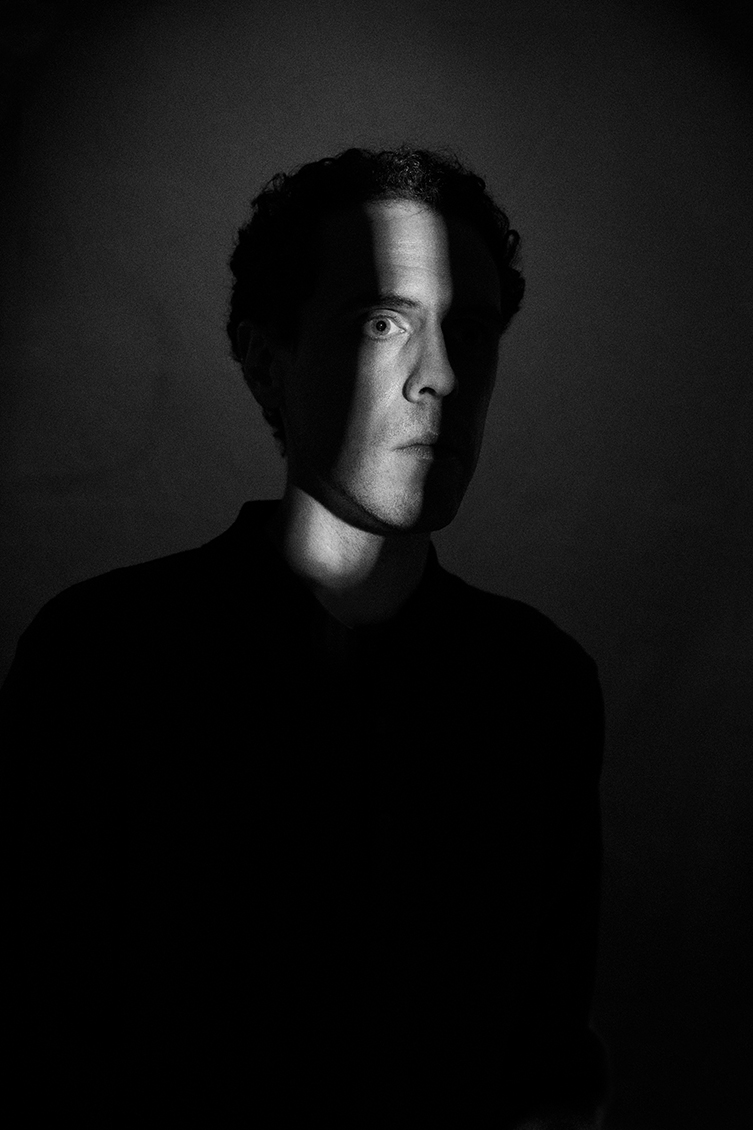
Cody Carpenter (Photo: Sophie Gransard)
DD: Plectrum?
GG: Pick.
DD: Oh! I use a Herco .75mm.
GG: Oh yeah, the silver ones.
DD: Yeah. And I use GHS Boomers, gauge 11.
GG: 11?
DD: Yeah.
GG: That’s pretty heavy man. For all the bending and stuff that you do? You must have strong hands!
DD: Uh, I don’t know! It doesn’t feel that heavy! My guitars are set up well: I think that has a lot to do with it too. The guy who sets up my guitar, I just say, ‘I want it to play nice and easy’ and it just does! I always played those strings. Sometimes I pick up someone else’s guitar and I’m like ‘Wow, this is easy to play!’ and it has lighter strings. But I’m just used to it, so why change it?
GG: Right, exactly! If it works for you, it works for you!
"A lot of John’s scores are riff-based, so something like Assault on Precinct 13, which is one of my favourite ones to play, it just has that really heavy riff"
DD: 11's don’t seem that heavy?
GG: Well, a lot of players use 9's and even gauge 8's! Those are more popular than ever. 11's are for the strong people! The Stevie Ray Vaughan fans, hahaha!
DD: I think he used 13's. I think you’re giving 11s too much credit!
GG: You might be right! Okay, so only a couple more questions, if that’s okay, Daniel?
DD: Yeah!
GG: You play a big part in the making of the music for Lost Themes, but when you guys are out touring, you guys are obviously playing John’s movie themes: Halloween, The Fog, The Thing.
DD: Right.
GG: How easy or difficult is it to make those recordings into something that works live with your band?
DD: At first, the most challenging part of that was just structuring out the songs to be played by a band. For film, you could do one section three times and then seven times, then six times to fit the picture, or it’s just to fit time or whatever. So, we had to re-structure them that way.
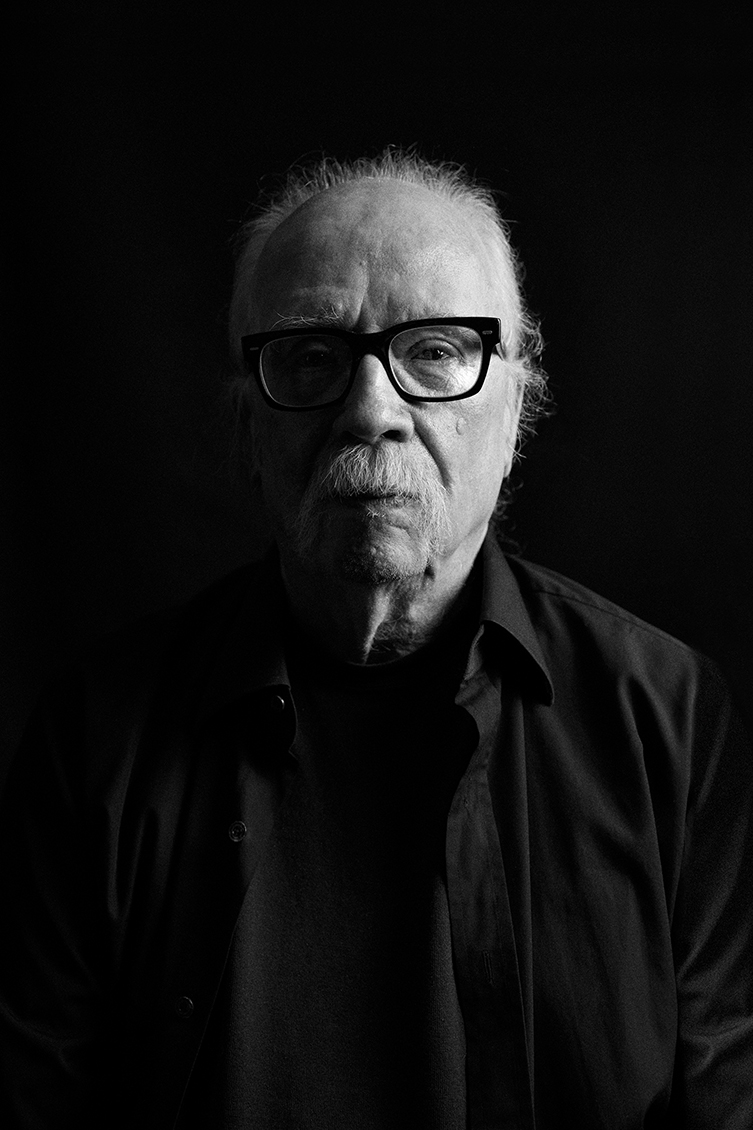
John Carpenter (Photo: Sophie Gransard)
A lot of John’s scores are riff-based, so something like Assault on Precinct 13, which is one of my favourite ones to play, it just has that really heavy riff. So, on that, I thought, ‘Oh, I’ll use an octave pedal and play it lower, so it has that kind of synth sound’ and then, you know, then I do a lead and then it’s the octave pedal, but it has down and up, so it’s sounds kinda synthy but kinda broken a little bit. On In the Mouth of Madness, there’s a big guitar solo. It’s just kinda figuring out what sounds good! Sometimes you can make the guitar sound more synth-like, and it just seems to fit. But not everything has guitar in it: Starman, I’m playing synth on that. So yeah, even Escape From New York has guitar in it. Because a lot of his scores are riff-based, it just lends itself well to the guitar. Bur something like Halloween, which originally doesn’t have guitar, you add guitar to those big chords, and it has a nice depth to it, you know?
GG: Yeah, that’s maybe what I was thinking. You have some lovely guitar moments but with Halloween and The Fog, it’s almost like you have to become part of that synthetic orchestra, with the guitar becoming a cello or something.
DD: Yeah! And even on The Thing, I play bow guitar on it, to kind of change it up too.
GG: Nice! That’s a great idea. So, before I say goodbye... after Covid is out of the way, are you guys gonna be touring again? And what are your upcoming plans for after the record’s release? The new solo EP?
DD: Well, we’ll have to see how long this goes on for, but you know, we would love to play live again! I think these songs, a lot of them would be a lot of fun to play. We just gotta see how long we’re all trapped in our houses for! Yeah, I’m excited for the album to come out, and for everyone to hear it. What’s next is the solo EP in May, and you know, at the beginning of Covid, we finished Halloween, that’s gonna be coming out at the end of this year...
GG: Oh, the movie?
DD: Yeah, we did the score to Halloween Kills, so hopefully that’ll be able to come out at the end of this year and everyone can get to hear what we did on that. So, it’s a bunch of fun stuff!
After this, I unsuccessfully petitioned Daniel for more info on the new Halloween movie (‘You’ll need to go see it to find out!') and we said our goodbyes. For a life-long John Carpenter fan, it was a real blast talking to him!
Horror is alive and well, and is sounding better than ever! John Carpenter’s Lost Themes III is released on Feb 5th on Sacred Bones records. You can find out more about that, and indeed everything else Carpenter-related by clicking through to the official John Carpenter website.
We’d like to thank Daniel for taking the time out to talk to us, and to Kate Price for putting us in touch!
Thank you for reading our interview! We have plenty more online here, so if you need more quality chats with artists, please head over to our guitarguitar Interviews page, and keep your eyes peeled for who may be coming next!


